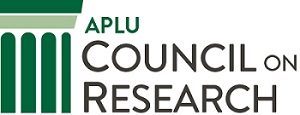
CoR NEWSNovember 8, 2018
To: APLU Council on ResearchFrom: APLU CoR Staff
- APLU Annual Meeting Update and Final Agenda
- Second Line Parade and House of Blues Reception at APLU Annual Meeting
- Request for Nominations for NASA PI Diversity Workshop
- AAU-APLU Science and Security Effective Practices Survey
- DOJ Announces New Initiative to Combat Chinese Economic Espionage
- National Science Board Statement on Security and Science
- NSF PAPPG Policy Changes
- Request for Information on Registration and Results Reporting Standards for Prospective Basic Science Studies Involving Human Participants
- NIH Updates Management of Genomic Summary Results Under GDS Policy
- Associations Request Clear Federal Guidance on Industrial Hemp Research
- USPTO Publishes New Procedures for Amendments in Patent Proceedings
We are so excited to see our 107 CoR registrants at APLU’s 2018 Annual Meeting in just a few short days! Our final CoR agenda is available here; it’s still not too late to register if you are interested in joining us in New Orleans on November 11-13 for the premier gathering of senior leaders from public research universities, land-grant institutions, and state university systems. For those unable to attend, presentations will be posted on the 2018 CoR Annual Meeting website in near real-time. Please let Sarah Rovito (srovito@aplu.org) know of any questions you may have.
Members of CoR are cordially invited to a second line parade with the Lagniappe Brass Band on Monday, November 12 at 5:30pm. The parade will begin at the Marriott and will conclude with a reception at the House of Blues. This event is generously sponsored by the Louisiana State University Office of Research & Economic Development, the University of New Orleans, the University of Louisiana at Lafayette, Louisiana Tech University, and Southern University Baton Rouge as well as by Elsevier and the University-Industry Demonstration Partnership (UIDP). We hope that many of you will be able to join us for what surely will be a fun and memorable evening!
NASA’s Science Mission Directorate will hold a workshop on November 27-28, 2018 to explore issues surrounding the lack of diversity among mission principal investigators. The workshop will bring together members of academia, industry, and government to discuss strategies to broaden participation in NASA’s missions through a more diverse cadre of mission principal investigators. Participants in the workshop will have an opportunity to share their observations about the process to become a mission principal investigator, including where there may be barriers to participation, and identify best practices and lessons learned about how to succeed in this role. The Science Mission Directorate invites institutions to nominate their up-and-coming researchers – especially those in Earth Science, Physics, and Astronomy – who have an interest in leading mission teams to attend. Please contact Ellen Gertsen at ellen.gertsen@nasa.gov to nominate a researcher from your institution or for more information.
Last week, APLU and AAU released a survey to gather information about effective policies, practices, tools and other resources that universities employ to protect against the theft of intellectual property and academic espionage and to prevent actions or activities by foreign governments and/or other entities that may infringe on core academic values. The survey was initially sent to government relations representatives and senior research officers, though other relevant people on campus may receive it as well through additional channels (i.e., the university export control association).
We encourage members of CoR to share the survey with campus representatives best equipped to answer the questions. There is no limit on how many examples an institution may submit and various representatives from any particular campus may offer examples. The deadline to complete the survey is Monday, November 19, 2018. A PDF version of the survey is available here for reference, although the examples must be submitted using the online form. Please contact Kacy Redd (kredd@aplu.org) with any questions.
On November 1, the Department of Justice (DOJ) announced a new initiative to reflect “…the Department’s strategic priority of countering Chinese national security threats and reinforce the President’s overall national security strategy.” Among the stated components of the initiative, the Attorney General has set goals to “…develop an enforcement strategy concerning non-traditional collectors (researchers in labs, universities, and the defense industrial base)” and to “…educate colleges and universities about potential threats to academic freedom and open discourse from influence efforts on campus.”
On October 24, the National Science Board (NSB) issued a statement regarding open research and national security issues. The statement reaffirms the principle behind National Security Decision Directive 189 (NSDD-189) that says, “The strength of American science requires a research environment conducive to creativity, an environment in which the free exchange of ideas is a vital component.” NSB also calls on U.S. universities and colleges to help “promote scientific openness and integrity and safeguard information that impacts national security and economic competitiveness.”
NSF recently sent the letter below concerning a revised version of the Proposal & Award Policies & Procedures Guide:
Dear Colleagues:
We are pleased to announce that a revised version of the NSF Proposal & Award Policies & Procedures Guide (PAPPG), (NSF 19-1) has been issued.
The new PAPPG will be effective for proposals submitted, or due, on or after January 28, 2019. Significant changes include:
- Addition of Research.gov as an option for proposal preparation and submission, and proposal file updates;
- Revision of eligibility standards for unaffiliated individuals;
- Specification that conference proposals over $50,000 and all equipment proposals must include the Collaborators and Other Affiliations information in the proposal submission;
- Revision of resubmission guidelines for NSF programs that accept proposals at any time;
- Implementation of NSF’s policy on sexual harassment and other forms of harassment, or sexual assault;
- Specification that proposers are required to have a policy or code-of-conduct that addresses sexual harassment, other forms of harassment, and sexual assault, and that includes clear and accessible means of reporting violations of the policy or code-of-conduct. This policy or code-of-conduct must be disseminated to conference participants prior to attendance at the conference as well as made available at the conference itself;
- Emphasis on the importance of training faculty in the responsible and ethical conduct of research;
- Incorporation of existing patent policy into the PAPPG. This policy was previously implemented by regulation at 45 CFR 650; and
- Numerous clarifications and other changes throughout the document.
You are encouraged to review the by-chapter summary of changes provided in the Introduction section of the PAPPG.
A webinar to brief the community on the new PAPPG will be held on November 27 at 2 PM EST. Additional information on the webinar, including registration instructions, can be found here.
While this version of the PAPPG becomes effective on January 28, 2019, in the interim, the guidelines contained in the current PAPPG (NSF 18-1) continue to apply. We will ensure that the current version of the PAPPG remains on the NSF website, with a notation to proposers that specifies when the new PAPPG (including a link to the new Guide) will become effective.
If you have any questions regarding these changes, please contact the Policy Office at policy@nsf.gov.
Regards,
The National Science Foundation
- Request for Information on Registration and Results Reporting Standards for Prospective Basic Science Studies Involving Human Participants
On August 10, NIH issued a Request for Information (RFI) on Registration and Results Reporting Standards for Prospective Basic Science Studies Involving Human Participants (NOT-OD-18-217). Through this Request for Information, NIH is requesting input on the standards NIH should use in assuring adequate registration and results information reporting for fundamental research studies involving human participants – hereafter referred to as “prospective basic science studies involving human participants.” Comments will be accepted through November 12, 2018, and can be made electronically here.
The National Institutes of Health (NIH) announced today that it will allow unrestricted access to genomic summary results from most NIH-supported studies for health or research purposes, while continuing to limit access to summary results from research studies with particular privacy concerns. This data management procedures update regarding the NIH Genomic Data Sharing (GDS) Policy is in response to NIH’s extended consultations with stakeholders regarding the risks and benefits of access to genomic summary results. As part of that engagement, NIH issued a Request for Comments for a proposed update in September 2017. The comments NIH received can be viewed here.
More information about this policy update can be found on the OSP Website and in the latest Under the Poliscope co-authored by Dr. Carrie D. Wolinetz and Dr. Eric D. Green: Protecting Participants, Empowering Researchers: Updating Access to Genomic Summary Results.
Questions about the updated policy may be sent to the NIH Office of Science Policy at SciencePolicy@od.nih.gov.
On November 5, APLU, together with the Council on Governmental Relations (COGR) and AAU, sent a letter to House and Senate Agriculture Committee leadership requesting that provisions included in the Senate version of the farm bill, which would provide clear federal guidance on industrial hemp research, be included in the final conference bill. The letter follows up on an April 19 letter to House and Senate leadership which expressed “concern about the significant legal, regulatory, and procedural impediments that prevent or make it difficult for researchers to conduct legitimate and important research on industrial hemp.”
On October 29, the Patent and Trademark Office (USPTO) published draft procedures for amending patent claims in inter partes review (IPR) and post-grant review (PGR) proceedings. The USPTO’s draft procedures propose a positive change to how the Patent Trial and Appeal Board (PTAB) would consider motions to amend claims and would allow parties to revise their claims more easily. The proposed changes were included in a series of recommendations that APLU, AAU, COGR, the Association of University Technology Managers (AUTM), and the Association of American Medical Colleges (AAMC) sent to USPTO earlier this year.
USPTO is seeking public input on this draft proposal by December 14, 2018. APLU is considering submitting comments with the other higher education associations and encourages campuses to consider submitting comments as well.




Stay Connected
X (formerly Twitter)
Facebook
YouTube
LinkedIn
RSS